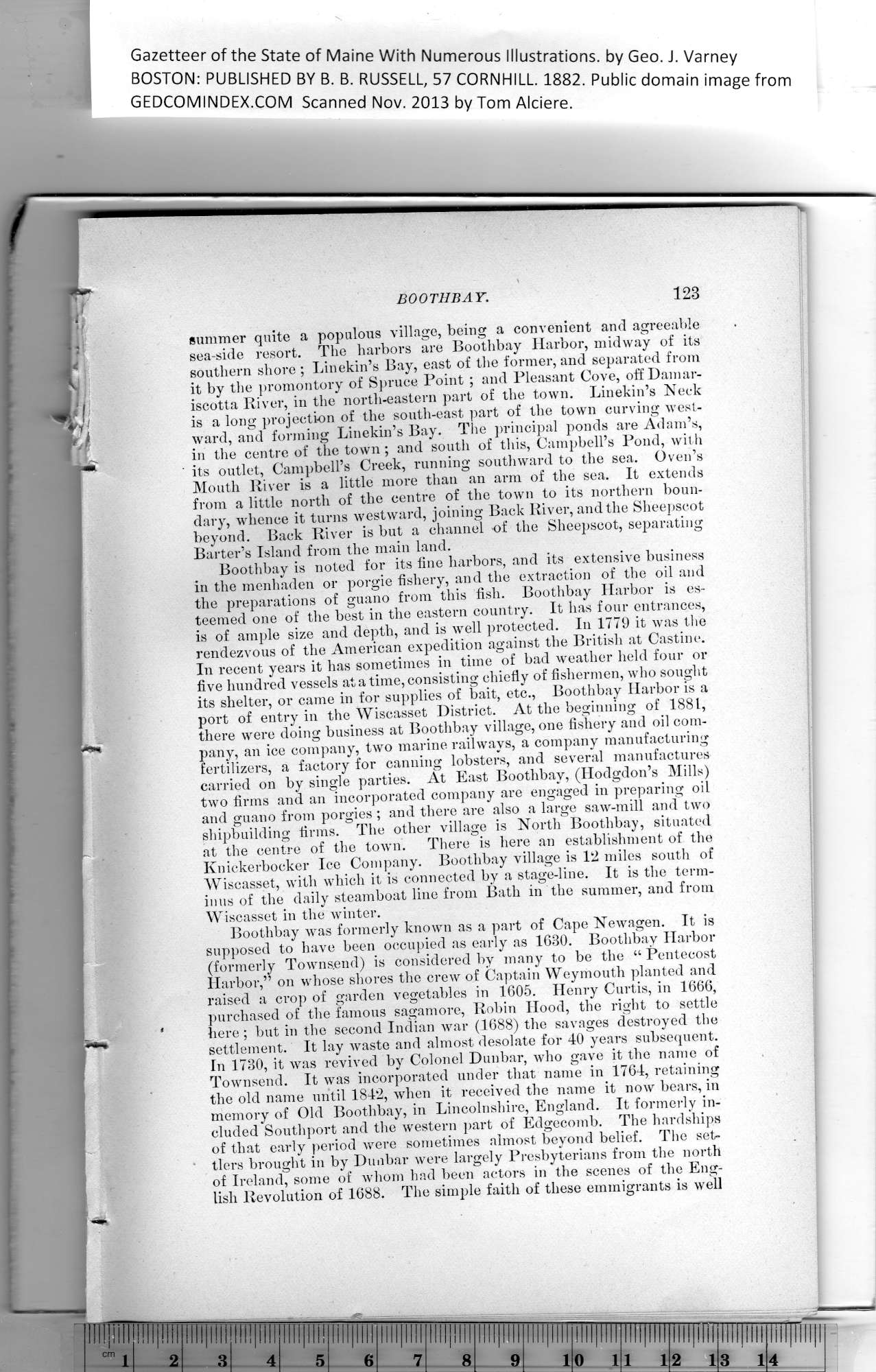|
Gazetteer of the State of Maine With Numerous Illustrations, by Geo. J. Varney
BOSTON: PUBLISHED BY B. B. RUSSELL, 57 CORNHILL. 1882. Public domain image from
summer quite a populous village, being a convenient and agreeable
sea-side resort. The harbors are Boothbay Harbor, midway of its
southern shore ; Linekin’s Bay, east of the former, and separated from
it by the promontory of Spruce Point ; and Pleasant Cove, off Dam ar-
iscotta River, in the north-eastern part of the town. Linekin’s Neck
is a long projection of the south-east part of the town curving west-
ward, and forming Linekin’s Bay. The principal ponds are Adam’s,
in the centre of the town ; and south of this, Campbell’s Pond, with
its outlet, Campbell’s Creek, running southward to the sea. Oven’s
Mouth River is a little more than an arm of the sea. It extends
from a little north of the centre of tbe town to its northern boun-
dary, whence it turns westward, joining Back River, and the Sheepscot
beyond. Back River is but a channel of the Sheepscot, separating
Barter’s Island from the main land.
Boothbay is noted for its fine harbors, and its extensive business
in the menhaden or porgie fishery, and the extraction of the oil and
the preparations of guano from this fish. Boothbay Harbor is es-
teemed one of the best in the eastern country. It lias four entrances,
is of ample size and depth, and is well protected. In 1779 it was the
rendezvous of the American expedition against the British at Castine.
In recent years it has sometimes in time of bad weather held four or
five hundred vessels at a time, consisting chiefly of fishermen, who sought
its shelter, or came in for supplies of bait, etc., Boothbay Harbor is a
port of entry in the Wiscasset District. At the beginning of 1881,
there were doing business at Boothbay village, one fishery and oil com-
pany, an ice company, two marine railways, a company manufacturing
fertilizers, a factory for canning lobsters, and several manufactures
carried on by single parties. At East Boothbay, (Hodgdon’s Mills)
two firms and an incorporated company are engaged in preparing oil
and guano from porgies ; and there are also a large saw-mill and two
shipbuilding firms. The other village is North Boothbay, situated
at the centre of the town. There is here an establishment of the
Knickerbocker Ice Company. Boothbay village is 12 miles south of
Wiscasset, with which it is connected by a stage-line. It is the term-
inus of the daily steamboat line from Bath in the summer, and from
Wiscasset in the winter.
Boothbay was formerly known as a part of Cape Newagen. It is
supposed to have been occupied as early as 1680. Boothbay Harbor
(formerly Towns.end) is considered by many to be tbe “ Pentecost
Harbor,” on whose shores the crew of Captain Weymouth planted and
raised a crop of garden vegetables in 1605. Henry Curtis, in 1666,
purchased of the famous sagamore, Robin Hood, the right to settle
here ; but in the second Indian war (1688) the savages destroyed the
settlement. It lay waste and almost desolate for 40 years subsequent.
In 1730, it was revived by Colonel Dunbar, who gave it the name of
Townsend. It was incorporated under that name in 1764, retaining
the old name until 1842, when it received the name it now bears, in
memory of Old Boothbay, in Lincolnshire, England. It formerly in-
cluded Southport and the western part of Edgecomb. The hardships
of that early period were sometimes almost beyond belief. The set-
tlers brought in by Dunbar were largely Presbyterians from the north
of Ireland, some of whom had been actors in the scenes of the Eng-
lish Revolution of 1688. The simple faith of these emmigrants is well
PREVIOUS PAGE ... NEXT PAGE
This page was written in HTML using a program written in Python 3.2
|
